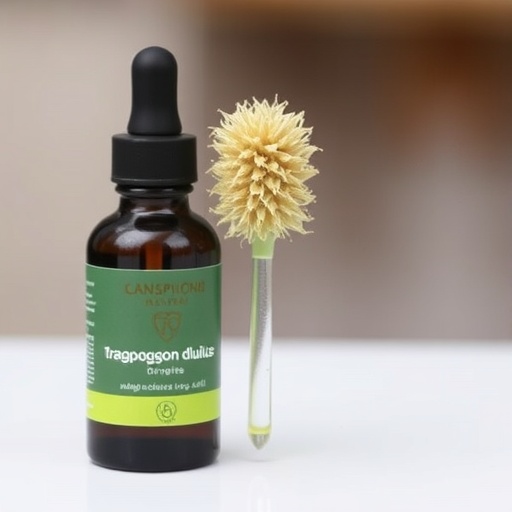In a groundbreaking study that may pave the way for novel oncological therapies, researchers have unveiled the potent anticancer properties of the essential oil extracted from Tragopogon dubius, a plant with a rich history in traditional medicine. This investigation elucidates the selective inhibitory effects of the essential oil on breast cancer (MCF-7) and glioblastoma (LN-18) cell proliferation, offering a promising complementary approach to conventional cancer treatments.
Tragopogon dubius, commonly referred to as yellow salsify, has long been recognized for its medicinal potential, yet its bioactive components and anticancer efficacy remained underexplored until now. The study employed a meticulous chemical profiling approach using gas chromatography-mass spectrometry (GCMS) and gas chromatography coupled with time-of-flight mass spectrometry (GCGCTOFMS), enabling precise identification and quantification of the complex phytochemical constituents responsible for its biological activity.
This comprehensive chemical analysis revealed a diverse array of bioactive compounds within the essential oil, many of which are known for their antioxidant and cytotoxic properties. These phytochemicals likely contribute synergistically to the observed cancer cell growth suppression. Specifically, the essential oil demonstrated marked cytotoxicity against MCF-7 breast cancer cells and LN-18 glioblastoma cells, two aggressive and therapeutically challenging cancer types.
A critical aspect of the study was the oil’s selective inhibitory action—it targeted malignant cancer cells without exerting significant toxicity on normal cellular counterparts. This selectivity is a highly desirable feature in anticancer agents, as it could translate to treatments that minimize the deleterious side effects commonly associated with chemotherapy and radiation therapy. Detailed viability assays confirmed that the essential oil markedly reduced proliferation rates in both cancer cell lines, underscoring its potential as a targeted bioactive compound.
The research also delved into the antioxidant capacity of Tragopogon dubius essential oil, employing established free radical scavenging assays. Antioxidants play a crucial role in neutralizing reactive oxygen species (ROS), which are implicated in cancer progression and resistance to therapy. By mitigating oxidative stress, the oil may not only prevent DNA damage but concurrently reduce the likelihood of tumorigenesis and metastasis.
Further reinforcing its genoprotective properties, the essential oil was shown to shield DNA from oxidative damage in in vitro models. This genoprotective effect implies potential utility in both cancer prevention and adjuvant therapy by preserving genomic integrity—a cornerstone of cellular health and function. Such dual functionality, combining antiproliferative and protective effects, is a particularly valuable trait in phytomedicinal agents.
Crucially, the study’s deployment of sophisticated chromatographic techniques—GCMS and GCGCTOFMS—allowed for the precise fingerprinting of the essential oil’s chemical profile. These analytic methods facilitated the identification of major constituents such as sesquiterpenes, monoterpenes, and phenolic compounds, many of which are documented to exhibit anticancer activities. This chemical elucidation is pivotal for standardizing extracts, optimizing therapeutic formulations, and conducting mechanistic investigations.
On a molecular level, the research postulates that the bioactive molecules within the oil may modulate key oncogenic pathways and apoptotic mechanisms, thereby exerting cytostatic effects on tumor cells. Although detailed mechanistic studies remain forthcoming, preliminary data suggest interference in cell cycle regulation and induction of programmed cell death through intrinsic apoptotic signaling cascades.
The implications of these findings are multifold. From a clinical perspective, the Tragopogon dubius essential oil represents a promising natural source of effective chemopreventive and chemotherapeutic agents. Its selective cytotoxicity against highly malignant cancers such as glioblastoma—a tumor notorious for its poor prognosis and resistance to treatment—is particularly noteworthy. Leveraging botanical resources in this manner advances the burgeoning field of phytopharmacology with tangible translational potential.
Moreover, this research supports a growing paradigm shift toward integrative oncology approaches that harness nature-derived compounds to complement existing therapies. The combination of antioxidant, genoprotective, and antiproliferative properties in a single botanical extract offers a compelling therapeutic profile, meriting further preclinical and clinical validation.
It is also important to consider the safety and pharmacokinetics of such essential oils in vivo. While in vitro outcomes are encouraging, establishing effective dosing parameters and understanding bioavailability, metabolism, and potential systemic effects will be critical before any clinical application. Ongoing studies are expected to elucidate these pharmacological parameters in animal models.
In addition to cancer inhibition, the antioxidative and genomic safeguarding effects suggest that Tragopogon dubius essential oil could have broader applications in managing oxidative stress-related disorders. This raises exciting possibilities for its role not only in oncology but also in chronic disease prevention and healthy aging.
Innovative natural product research like this exemplifies the untapped potential residing in plant biodiversity. By integrating advanced chemical profiling and rigorous biological testing, scientists are successfully bridging the gap between traditional herbal knowledge and modern medicine, potentially enriching the pharmaceutical arsenal against some of humanity’s most formidable diseases.
The study’s methodological rigor and multifaceted evaluation—from chemical characterization to functional bioassays—set a high standard for future natural product research in oncology. Continued research will doubtlessly illuminate novel mechanisms through which Tragopogon dubius exerts its anticancer effects and optimize its usage for maximal therapeutic benefit.
In summary, this investigation into Tragopogon dubius essential oil underscores a compelling advance in the search for selective, effective, and natural anticancer agents. The convergence of selective cytotoxicity to breast and glioblastoma cancer cells, robust antioxidant activity, and DNA protection heralds a versatile phytochemical tool with significant therapeutic promise. As research progresses, this botanical extract may well become a key player in next-generation cancer therapies, redefining the interface between nature and science in the fight against cancer.
Subject of Research: Essential oil from Tragopogon dubius and its selective antiproliferative effects on breast and glioblastoma cancer cells, alongside its antioxidant and genoprotective potential.
Article Title: Essential oil from Tragopogon dubius selectively inhibits breast (MCF-7) and glioblastoma (LN-18) cancer cell proliferation; insights into antioxidant, genoprotective potential, and GCMS, GCGCTOFMS-based profiling.
Article References: Ahmad, S.S., Chandni, Fouad, D. et al. Med Oncol 42, 540 (2025). https://doi.org/10.1007/s12032-025-03092-7
Image Credits: AI Generated
DOI: https://doi.org/10.1007/s12032-025-03092-7
Tags: anticancer properties of plantsbioactive compounds in essential oilsbreast cancer treatment alternativescomplementary cancer therapiescytotoxic effects on cancer cellsGCMS chemical profiling in oncologyglioblastoma cell inhibitionherbal medicine in oncologyphytochemical analysis of Tragopogonselective inhibition of cancer proliferationtraditional medicine and cancerTragopogon dubius essential oil





